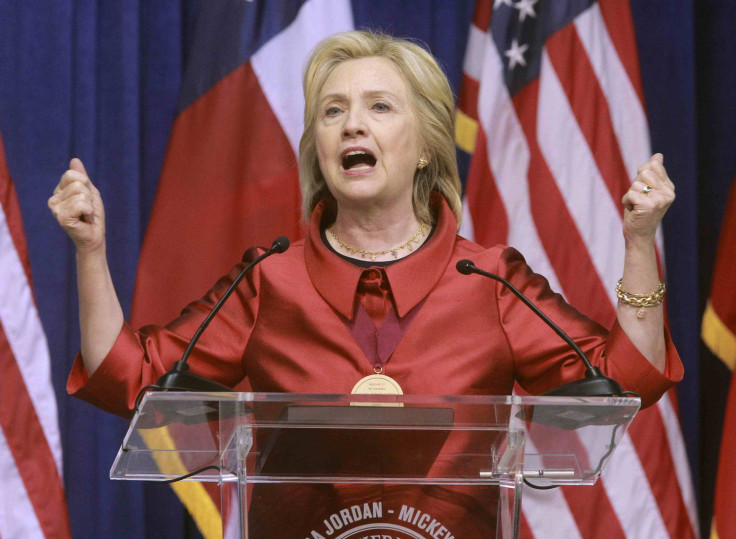Election 2016: Hillary Clinton Tied To Barack Obama, Bill Clinton; How She Should Define Herself

WASHINGTON -- As Hillary Clinton delivers her big campaign launch speech in New York on Saturday, Republican operatives and rival campaign staffers will be huddled in front of their televisions, looking for an opportunity to pounce. They would like nothing more than a chance to paint a Clinton victory as a third term for President Barack Obama, or a more liberal version of her husband, former President Bill Clinton. Bonus points if they can do both at the same time.
Hillary Clinton would no doubt prefer not to spend the campaign sharing the stage with Obama and her husband, even metaphorically. Doing so would energize the GOP base -- which loathes both men -- and only strengthen the argument that she’s a product of the past and not a leader for the future.
But Democrats don't want her to cut ties to either man. She's no wallflower, they argue; she doesn't need to worry about being stuck in anybody's shadow.
What Democrats want from Hillary Clinton is more of what George H.W. Bush used to call "the vision thing." The Saturday speech will kick off a series of addresses from the Democratic front-runner. In the coming months, Clinton is expected to deliver dozens of policy speeches and announcements. One of the loudest criticisms of her campaign so far -- apart from stories about her secret emails or Clinton Foundation finances -- has been how little she has actually revealed about her views.
“There is a part of me that understands why she and her team are so cautious, but I for one would like to see her be a little more aggressive when it comes to staking out positions on issues,” said Jim Manley, a Democratic strategist.
The few bold statements that Clinton has made have been largely welcomed. For Rep. Raul Grijalva, D-Ariz., who co-chairs the Congressional Progressive Caucus, her embrace of immigration reform is a happy contrast with the two previous Democratic administrations. “Her husband stumbled toward a policy in immigration and actually ended up putting some things in place that made the situation worse," Grijalva said. "While Barack worked toward defining a position, she’s pretty straight-up. I think that’s the advantage, her positions can have a lot more clarity.”
Grijalva, who hasn't endorsed any 2016 candidate yet, wants to see more of that. “I think she needs to be more definitive on this trade issue,” he said. “She needs to be more definitive on climate change and the [Keystone XL] pipeline. She needs to be more definitive on what regulatory muscle her administration would use on Wall Street to keep them under control. And the overarching issue, the income inequality issue. I think she needs to be more defining than she has been. But if she does -- if she makes some defining statements like she did on immigration and voter empowerment -- I think you will find people comparing her well.”
It’s almost impossible to escape the comparisons, in any case, especially in a hypermedia age when the news cycle is measured in minutes and Twitter, Facebook and Snapchat will amplify every utterance. When Clinton spoke out about justice system reform, it was cast as a repudiation of her husband’s 1994 crime bill. She’s being pressed to say whether she agrees with her husband’s decision to sign a deal with Republicans that overhauled the welfare system. And she will need to explain how her approach to fighting the Islamic State group might differ from Obama's.
Even the absence of a position is open to analysis. Take the latest battle in Congress to pass a Trade Promotion Authority law. Obama has pushed for the legislation. Clinton hasn't taken a strong position on the deal, which has drawn considerable Democratic opposition. So without a clear statement from Hillary Clinton, opponents and pundits have pointed to Bill Clinton’s signing of the North American Free Trade Agreement, known as NAFTA, and extrapolated that the former secretary of state probably supports the deal.
But Clinton can strategically find the places to disagree. “As much as we admire Bill, we’re not voting for him, we’re voting for her,” said Democratic Rep. Gerry Connolly of Virginia, who already has endorsed the former secretary of state. “It was a different time then, there is a different view today, the country has shifted. Her ability to evolve and respond to those shifts is a test all of us will apply in terms of her suitability for office. I don’t want to vote for someone who is stuck in the mid-1990s.”
He added, “She can acknowledge that -- look at gay rights; we’re light-years away from where we were with ‘Don’t Ask, Don’t Tell’ and [the Defense of Marriage Act] and she recognizes that and has moved on.”
And there are worse things than being tied to the few fellow Democrats who recently managed to win the presidency twice. “Among Democratic primary voters, a close association with two popular progressive presidents isn't exactly a handicap," said Mark Hannah, former aide to John Kerry's and Obama’s campaigns. “She shouldn't make the same mistake Al Gore did in trying to distance himself too much from the administration he served. Her campaign shouldn't have to spend too much time distinguishing her -- she's distinguished enough as it is.”
© Copyright IBTimes 2024. All rights reserved.






















